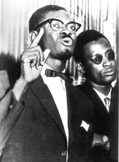Cry Freedom
 Patrice Lumumba, first prime minister of the Republic of Congo and a pioneer of African unity, was executed on 17 January 1961. Centre of the country’s popular defiance towards the colonial Belgium ruthless exploitation, he is remembered by his generation for his unscheduled speech at the official ceremonies in Kinshasa where he denounced "a humiliating slavery imposed by brute force,". Soon after he was arrested, tortured and murdered. The Congo has been paying for it ever since.
Patrice Lumumba, first prime minister of the Republic of Congo and a pioneer of African unity, was executed on 17 January 1961. Centre of the country’s popular defiance towards the colonial Belgium ruthless exploitation, he is remembered by his generation for his unscheduled speech at the official ceremonies in Kinshasa where he denounced "a humiliating slavery imposed by brute force,". Soon after he was arrested, tortured and murdered. The Congo has been paying for it ever since.Many say that, although he picked the right fight to free its people from colonialism, his survival would not necessarily have insured prosperity and happiness to the country. His liberator's aspirations were confronted with ugly realities. In prison he wrote: "We are not alone. Africa, Asia, and the free and liberated peoples in every corner of the globe will ever remain at the side of the millions of Congolese who will not abandon the struggle until the day when there will be no more colonizers and no more of their mercenaries in our country. (...) I know my country, now suffering so much, will be able to defend its independence and its freedom. Instead no one much cares about it. People have continued to use first the Congo crisis and then the continued suffering of the people of that vast country for their own purposes and ends. History proved him right; and Congo's enormous reserve of natural resources keeps exciting appetites of Congolese and their neighbours.
 Lumumba's assassination has been hidden for decades but was not erased from all the history books. It galvanized the African independence movement from the 60s onward. More, he entered history and became an iconic leader; today Lumumba is likely to be named if the topic of murdered African statesmen comes up. The Soviets even named their Moscow University for foreign students after him, to serve as a constant reminder (and probably because of the role played by the western powers and the UN in his death). Although he remains an inspiration for the old generation of Congolese and a romantic hero for the youngest, the world has changed so much since Lumumba's gone. In a globalized world, there are many threats to peace building in COngo. In many ways, Lumumba's days are gone.
Lumumba's assassination has been hidden for decades but was not erased from all the history books. It galvanized the African independence movement from the 60s onward. More, he entered history and became an iconic leader; today Lumumba is likely to be named if the topic of murdered African statesmen comes up. The Soviets even named their Moscow University for foreign students after him, to serve as a constant reminder (and probably because of the role played by the western powers and the UN in his death). Although he remains an inspiration for the old generation of Congolese and a romantic hero for the youngest, the world has changed so much since Lumumba's gone. In a globalized world, there are many threats to peace building in COngo. In many ways, Lumumba's days are gone.
0 Comments:
Post a Comment
<< Home